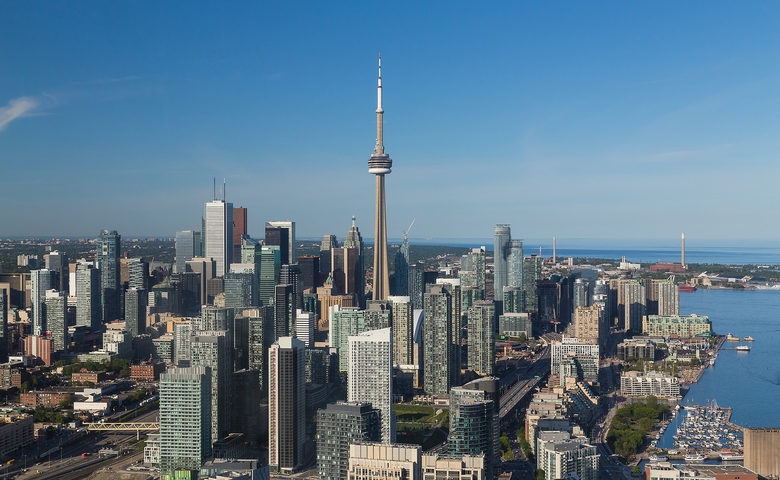It has been a year since the first coronavirus case was reported. What a difference a year can make.
Every aspect of our lives has been altered: our professional growth, household situations, and our consumer behaviours. Will we ever return to a pre-pandemic normal? At this point, it is unclear.
If there were one industry that seems to have been immune from COVID-19 it is the Canadian real estate market. From Atlantic Canada to the prairies, close to every municipality is recording monumental growth in the housing industry. A red-hot market that has taken it to another level during these chaotic times has been Toronto.
Even before the COVID-19 pandemic, Toronto had been a red-hot metropolis. Fast forward to the present, it is doing (mostly) better than it was a year ago, if that is even possible. So, what’s going on with the Toronto housing market?
State of the Toronto Housing Market
The Toronto real estate market data point to an interesting trend: The housing sector in North America’s fourth-largest city is doing better now than it did before the coronavirus pandemic paralysed the Canadian economy.
The last few months of 2020 provided a great example of how the Toronto housing market is booming.
According to the Toronto Regional Real Estate Board (TRREB), home sales surged 24.3 per cent year-over-year in November, and the average selling price for all homes combined was up by 13.3 per cent to $955,615.
Competition for single-family homes was fierce, resulting in double-digit annualised gains in average selling prices for detached, semi-detached, and townhouses. The condominium market continued to experience an influx of supply, with new listings doubling from the same time a year ago.
Toronto Property Sales (October 2020 - December 2020)
Source: Toronto Regional Real Estate Board (TRREB)
Is the Toronto housing market overvalued?
With Toronto housing prices nearing $1 million, does this mean the city is overvalued? In its latest Housing Market Assessment (HMA) for the third quarter of 2020, which assesses four main components:
- Overbuilding
- Overheating
- Overvaluation
- Price acceleration
The Canada Mortgage and Housing Corporation (CMHC) contends that there is little evidence of overvaluation. According to the quarterly report, Toronto’s real estate conditions are moderate.
“Although the unprecedented income supports from governments provided temporary relief, the COVID-19 crisis negatively affected the level of permanent disposable income available to households,” said Bob Dugan, CMHC’s chief economist, in a statement. “Along with the weakening of other drivers of the housing market, overvaluation imbalances increased further or started to emerge in several markets in the third quarter of 2020.”
Housing Market Vulnerability in Toronto (2019 – 2020)
| May 2019 | Feb 2020 | Dec 2020 | |
|---|---|---|---|
| Overall assessment | High | Medium | Medium |
| Overbuilding | Low | Low | Low |
| Overheating | Medium | Medium | Low |
| Overvaluation | Medium | Low | Low |
| Price acceleration | Medium | Medium | Low |
Source: Canada Mortgage and Housing Corporation (CMHC)
Mortgage delinquency
Canada has witnessed a boom in housing starts. In November, national housing starts increased by 3.81 per cent, from 222,989 to 231,491. In Toronto, there were 2,913 starts in November, up 40.3 per cent from the same time a year ago. All-time low borrowing costs could explain this.
Unfortunately, it is not all sunshine and rainbows in some of the country’s hottest markets. According to the CMHC, Toronto and Vancouver’s mortgage delinquency rates surged to their highest levels since 2016 in the July-to-September period, surging to 0.12% and 0.16%, respectively.
The numbers are surprising, especially at a time when the country’s two biggest markets are witnessing record sales activity and prices, as well as the federal government and the Bank of Canada (BoC) introducing policy measures to prevent widespread defaults. An increase in delinquencies typically occurs when there is a paucity of buyers and limited liquidity. The only explanation could be a weak economy.
Mortgage Delinquency Rates in Toronto (2017 - 2020)
Source: Canada Mortgage and Housing Corporation (CMHC)
How COVID-19 Impacted the Real Estate Market
At the beginning of the COVID-19 public health crisis, there was plenty of uncertainty in both the Canadian real estate market and the broader economy. The housing sector did exhibit a sigh of relief when provincial governments designated it as an essential service. This allowed industry professionals to quickly adapt to the situation by:
- Adopting digital tools and paperwork.
- Employing virtual tours.
- Practicing the necessary public health guidelines.
But what did the highly infectious respiratory illness mean for sales and prices? In Toronto, there was a two-month pause (March and April), and some had anticipated the pandemic to trigger a long-term COVID discount. This prognostication turned out to be incorrect as the recovery accelerated faster than what the analysts had anticipated. Instead of a long-term downturn, the major urban centre reported record-setting growth, thanks to the pent-up demand that has been fully exhausted.
Post-COVID real estate trends
However, some new trends formed in the aftermath of the pandemic.
The central bank slashed interest rates to 0.25 per cent and lowered the benchmark five-year mortgage rate to below five per cent. This made borrowing the cheapest it had ever been, and these historically low rates gave homebuyers more options at their disposal. In other words, they could borrow more to acquire a larger property.
One of the Ontario government’s responses to the coronavirus was to clamp down on the short-term rental market (Airbnb). This decimated thousands of condo owners across the city, many of which relied entirely on this revenue to pay down their mortgage.
As a result, these individuals transformed their units into long-term rentals, which flooded the market with new supply. This development sent rental prices spiraling downward by as much as 20% in just a few short months following a decade of immense growth. At the same time, the average selling prices for condominiums slumped three per cent year-over-year in November, the first time since April, according to TRREB.
Ultimately, this is either a buyer’s market or a renter’s one.
Average Rent for Apartments in Toronto (2019 - 2020)
Source: Toronto Regional Real Estate Board (TRREB)
Condos vs. houses
When you live in a city like Toronto, you generally pay a premium to have immediate access to a diverse array of amenities. The pandemic removed many of the attractive features of big city living. Back when COVID-19 first emerged in Toronto, there was a sharp decline in condominium sales compared to the previous year. Sales trends only seemed to recover in the recent months.
It might seem counterintuitive, but the financial crisis and the public health crisis have led to new opportunities for both homeowners and homebuyers – unless you are a condo owner.
Now that borrowing costs are at rock bottom, Toronto homebuyers are reconsidering a 700-square-foot two-bedroom unit and thinking about buying a detached, semi-detached, or townhouse, even if it costs $100,000 or $200,000 more within the city. If they cannot find a home that is relatively tailored to their budgets, they are relocating to the Greater Toronto Area, such as Peel, Durham, and York.
Condo owners are also trying to sell their units and take the profits to upgrade to a single-family home. Unfortunately, since there is a huge supply of condominiums on the market, owners who may have purchased a condo near the top of the market might not earn a double-digit return on their investment. They generally have two choices: collect rent that would be less than the mortgage payment or sell at a discounted loss.
As many people were forced to alter their living arrangements and stay home to mitigate the spread of the virus, they reexamined their priorities in a myriad of ways. Is it comfortable to reside in a so-called shoebox condo with a family of four? Or would it be better to have more space in a three-bedroom house?
In the end, the once-in-a-century public health disaster forced many to reconsider how they live.
Condominium Sales in Toronto (2020 vs. 2019)
Source: Toronto Regional Real Estate Board (TRREB)
Will Relocation Affect the Housing Sector?
Is Toronto witnessing an exodus or a relocation?
That is the question for real estate agents and industry observers moving forward. This year, more households have been leaving large cities and fleeing to suburban towns and rural communities. Some believe that the trend is overblown, but the data do still highlight a growing number of people exiting Toronto and its metropolitan neighbours for smaller areas.
There has not been specific data to highlight the change in municipal population. But Statistics Canada did confirm that there were fewer moves between provinces and territories in the third quarter, falling 21 per cent year-over-year. This could explain why many organisations and experts are apprehensive about referring to anything related to an exodus.
Over the last year, many businesses – large and small – have adopted work-from-home policies. This has given professionals the opportunity to work remotely and live somewhere else that is not concentrated in the downtown core. Because employees have the freedom to work anywhere they wish – for now – many are choosing to leave their two-bedroom apartment in the 416 for a four-bedroom semi-detached house in the 905 or 289.
Immigration trends in Canada
The lack of immigration took a huge bite out of certain segments of Toronto’s real estate market, primarily condo ownership and apartment rentals. Immigrants have played an integral role in these elements of the housing sector. But Ottawa introduced new border controls and travel restrictions that limited the number of newcomers and permanent residents into Canada.
For example, in August, Canada welcomed a little more than 11,000 new permanent residents. This was down from the nearly 14,000 immigrants in July. The figure was also about a third of the roughly 32,000 immigrants welcomed in August 2019. For the first time this century, Canada’s permanent resident intake will fall short of 200,000.
It appears that 2021 will not be much different, with the federal government not indicating any easing of its coronavirus-induced immigration protocols. This is especially true now that nations are confirming new strains of COVID-19. Until most of the country is injected with the coronavirus vaccine, and the rest of the world reports improvements in case numbers, it is unlikely that Ottawa will allow immigration to return to pre-pandemic levels.
New Immigrants in Canada (2017 - 2020)
Source: Statistics Canada
What Real Estate Trends Are Forming Heading Into 2021?
According to the RE/MAX Toronto Housing Market Outlook (2021), the average price will increase six per cent to $974,015 across all property types in 2021, buoyed by growing demand and low supply.
The coronavirus pandemic has thrown a wrench into making accurate forecasts about the 2021 Toronto housing market, as well as the broader Canadian real estate industry. The condo slump, borrowing glut, short-term rentals, a demographic turning point, and evolving homebuying preferences are only some of the factors that industry analysts will home in on over the next several months.
The main thing, however, will be how the pandemic is managed. Whether new infections are mounting or subsiding by the middle of spring, a final solution to this challenging public health calamity will be the primary driver of every industry. It might be premature to talk about life returning to a pre-pandemic normal, but seeing light at the end of the tunnel is paramount during these trying times.









